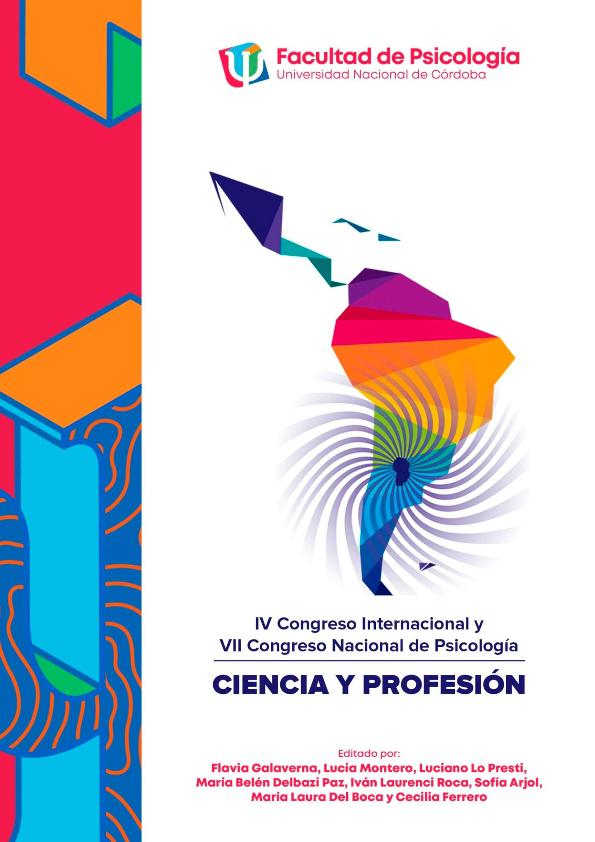Mostrar el registro sencillo del ítem
dc.contributor.author
Leyes, Candela Abigail
dc.contributor.author
López Steinmetz, Lorena Cecilia

dc.contributor.other
Galaverna, Flavia Soledad

dc.contributor.other
Montero, Luciano

dc.contributor.other
Lo Presti, Luciano Iván

dc.contributor.other
Delbazi Paz, María Belén
dc.contributor.other
Laurenci Roca, Iván
dc.contributor.other
Arjol, Sofía
dc.contributor.other
del Boca, María Laura

dc.contributor.other
Ferrero, Cecilia
dc.date.available
2022-05-02T18:43:16Z
dc.date.issued
2020
dc.identifier.citation
Consumo de bebidas alcohólicas según expectativas y contextos en estudiantes universitarios jóvenes residentes en Córdoba; IV Congreso Internacional de Psicología y VII Congreso Nacional de Psicología: Ciencia y Profesió; Córdoba; Argentina; 2020; 270-270
dc.identifier.uri
http://hdl.handle.net/11336/156259
dc.description.abstract
Introducción: Las expectativas hacia el alcohol (EA) y los contextos de consumo (CC) pueden ser relevantes en la regulación de la ingesta de bebidas alcohólicas en jóvenes. Objetivos: Evaluar asociaciones entre el consumo semanal de bebidas alcohólicas y a) las EA positivas, b) las EA negativas y, c) los CC (facilitación social, aceptación del grupo de pares, control parental, control del stress), en estudiantes universitarios jóvenes residentes en Córdoba. Métodos: La muestra incluyó 300 participantes (70% mujeres, 30% varones) de 17 a 24 años (media = 20.79, ±sd 1.85). Se administraron, en línea, tres instrumentos: Cuestionario sociodemográfico (ad hoc); Cuestionario de Expectativas hacia el Alcohol para Adolescentes (CEA-A); Cuestionario de Contextos de Consumo de Alcohol para Adolescentes (CCCA-A). La cantidad de bebidas alcohólicas se midió en vasos. Los datos no cumplieron los supuestos de normalidad (test de Shapiro-Wilk < 0.05) y homocedasticidad (test de Bartlett < 0.05). Se calcularon estadísticos descriptivos y asociaciones (coeficiente de correlación de Spearman). El p-valor se fijó en ≤ 0.05. Resultados: El consumo semanal de bebidas alcohólicas fue, en promedio, de 3.58 vasos (±sd 2.85; mediana = 3). Mayor ingesta de bebidas alcohólicas se asoció con mayores puntajes de EA positivas, pero también con mayores puntajes de EA negativas. Además, mayor ingesta de bebidas alcohólicas se asoció de manera directa y significativa con los CC facilitación social, control parental y control del stress. En cambio, la cantidad de bebidas alcohólicas consumidas no se asoció con el CC aceptación del grupo de pares. A diferencia de lo que señala la literatura respecto a que las EA negativas, a diferencia de las EA positivas, se asocian con una menor ingesta de alcohol, estos hallazgos sugieren que cuanto más favorablemente los jóvenes evalúan los efectos perjudiciales del consumo de alcohol, mayor es su consumo general de alcohol.
dc.description.abstract
Introduction: Alcohol expectancies (AE) and contexts of consumption (CC) may be relevant in the regulation of alcohol consumption among young people. Aims: To examine associations between the amount of weekly alcohol intake and a) positive AE, b) negative AE, and c) CC factors (social facilitation, peer group acceptance, parental control, and stress control), in young college students living in Córdoba. Methods: The sample consisted of n = 300 (70% women, 30% men) aged between 17 to 24 (mean = 20.79, ±sd 1.85). Three instruments were administered online: Socio-demographic data questionnaire (ad hoc); the Alcohol Expectancy Questionnaire for Adolescents form (CEA-A); the Drinking Contexts Questionnaire – Adolescent form (CCCA-A). The amount of alcoholic beverages consumed was measured in glasses. The data did not fit the assumptions of normality (Shapiro-Wilk test < 0.05) and homoscedasticity (Bartlett test < 0.05). Descriptive and association (Spearman correlation coefficient) statistics were calculated. The p-value was set at ≤ 0.05. Results: The weekly alcohol intake was, on average, of 3.58 glasses (±sd 2.85; median = 3). Higher alcohol intake was associated with higher scores of positive AE, but also with higher scores of negative AE. Higher alcohol intake was also direct and significantly associated with the CC social facilitation, parental control, and stress control. On the contrary, the amount of alcohol intake was not associated with the CC peer group acceptance. Instead of supporting that negative AE, unlike positive AE, are associated with a lower alcohol intake – as literature reports –, these findings suggest that the more favorably the young people evaluate the impairment effects of drinking, the greater their overall alcohol consumption.
dc.format
application/pdf
dc.language.iso
spa
dc.publisher
Universidad Nacional de Córdoba. Facultad de Psicología
dc.rights
info:eu-repo/semantics/openAccess
dc.rights.uri
https://creativecommons.org/licenses/by-nc-sa/2.5/ar/
dc.subject
BEBIDAS ALCOHÓLICAS
dc.subject
JÓVENES
dc.subject
SOCIALIZACIÓN
dc.subject
CONDUCTAS DE RIESGO PARA LA SALUD
dc.subject.classification
Otras Psicología

dc.subject.classification
Psicología

dc.subject.classification
CIENCIAS SOCIALES

dc.title
Consumo de bebidas alcohólicas según expectativas y contextos en estudiantes universitarios jóvenes residentes en Córdoba
dc.type
info:eu-repo/semantics/publishedVersion
dc.type
info:eu-repo/semantics/conferenceObject
dc.type
info:ar-repo/semantics/documento de conferencia
dc.date.updated
2022-04-26T20:44:02Z
dc.journal.pagination
270-270
dc.journal.pais
Argentina

dc.journal.ciudad
Córdoba
dc.description.fil
Fil: Leyes, Candela Abigail. Universidad Empresarial Siglo XXI; Argentina
dc.description.fil
Fil: López Steinmetz, Lorena Cecilia. Universidad Nacional de Córdoba. Instituto de Investigaciones Psicológicas. - Consejo Nacional de Investigaciones Científicas y Técnicas. Centro Científico Tecnológico Conicet - Córdoba. Instituto de Investigaciones Psicológicas; Argentina
dc.relation.alternativeid
info:eu-repo/semantics/altIdentifier/url/https://rdu.unc.edu.ar/bitstream/handle/11086/20080/0000%20Libro-Congreso%20Ciencia%20y%20Profesio%cc%81n%20%202020.pdf?sequence=1&isAllowed=y
dc.conicet.rol
Autor

dc.conicet.rol
Autor

dc.coverage
Internacional
dc.type.subtype
Congreso
dc.description.nombreEvento
IV Congreso Internacional de Psicología y VII Congreso Nacional de Psicología: Ciencia y Profesió
dc.date.evento
2020-11-10
dc.description.ciudadEvento
Córdoba
dc.description.paisEvento
Argentina

dc.type.publicacion
Book
dc.description.institucionOrganizadora
Universidad Nacional de Córdoba. Facultad de Psicología
dc.source.libro
IV Congreso Internacional de Psicología y VII Congreso Nacional de Psicología: Ciencia y Profesión
dc.date.eventoHasta
2020-11-14
dc.type
Congreso
Archivos asociados
